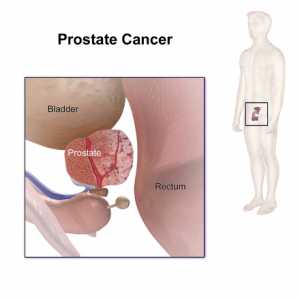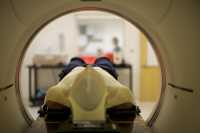While prostate cancer can be serious, most patients can be managed with the proper treatment. With the use of medications,...
Author Interviews, Nutrition, Prostate Cancer / 29.12.2024
Lifestyle Choices the Protect Against Prostate Cancer By Dr. Dan Sperling
By Dr. Dan Sperling M.D., D.A.B.R.
Medical Director and Chief of Interventional Uroradiology at the
Sperling Prostate Center in Florida
Medical Director of its parent practice, the Sperling Medical Group
If the name Dr. Dean Ornish rings a bell, it’s probably because over 30 years ago he became the poster boy for preventing heart disease through diet and exercise. His 1990 book, “Dr. Dean Ornish's Program for Reversing Heart Disease,” made the NYTimes best seller list. To this day, when we think of Dr. Ornish, we think of a long and heart-healthy life.
Although we don’t link Dr. Ornish with prostate health, there’s good reason to do so—but most men don’t know it. In 2008, the National Academy of Sciences published research by Dr. Ornish and his team in an article titled “Changes in prostate gene expression in men undergoing an intensive nutrition and lifestyle intervention.” They broke new ground in our understanding of preventing prostate cancer (PCa).
Dr. Ornish and his team showed that a comprehensive lifestyle program they designed actually caused changes in gene regulation. They designed an experimental lifestyle protocol and tested is on 30 PCa patients; all 30 had been diagnosed with low-risk PCa and were on Active Surveillance (no other treatment). At the start of the 3-month study, each patient’s biopsy samples were used to profile his PCa gene activity. Then all participants adhered faithfully to the following protocol:
- A vegan (plant-based) diet (with 10% of calories from fat
- Physical activity (walking 30 minutes a day for 6 days a week)
- Stress reduction (yoga, progressive relaxation, breathing, meditation)
- Dietary supplements (vitamins C and E, soy, fish oil, selenium)
- A weekly support group to provide advice and sustain adherence to the program.
Author Interviews, Brigham & Women's - Harvard, Genetic Research, JAMA, Karolinski Institute, Prostate Cancer / 05.07.2024
Prostate Cancer: Men With Genetic Risk at Increased Risk of Dying Early
MedicalResearch.com Interview with:
Anna Plym PhD
Department of Medical Epidemiology and Biostatistics,
Karolinska Institutet, Stockholm, Sweden
Department of Epidemiology, Harvard T. H. Chan School of Public Health
Department of Urology, Brigham and Women’s Hospital
Harvard Medical School, Boston, Massachusetts
MedicalResearch.com: What is the background for this study?
Response: Prostate cancer is one of the leading causes of cancer death among men, with approximately one third of the deaths occurring before the age of 75 years. There is a need for a better understanding of the risk factors for those early deaths. Our previous research has indicated that inherited factors play a major role.
(more…)
Author Interviews, Cancer Research, Prostate, Prostate Cancer, Urology, Vaccine Studies / 08.04.2024
AACR24: Icahn Mt. Sinai Study of Autovaccination Turns Cold Prostate Cancer Cells Hot
MedicalResearch.com Interview with:
Sujit Nair, PhD
Director of GU Immunotherapy Research
Department of Urology
Icahn School of Medicine at Mount Sinai
MedicalResearch.com: What is the background for this study? How is the vaccine obtained?
Response: https://classic.clinicaltrials.gov/ct2/show/NCT03262103
Dr. Tewari is the treating physician and clinical lead on the study. This is a phase I, open-label, clinical trial (NCT03262103) using a dose escalation strategy in 12 patients diagnosed with clinically localized prostate cancer with plans for surgery. The investigational agent used in the trial is Poly-ICLC, an immune modulator developed by ONCOVIR. Poly-ICLC is a double-stranded RNA that mimics viral activity, thereby stimulating the immune response.
(more…)
Author Interviews, Cancer Research, Prostate Cancer, Radiology / 25.03.2024
SIR24: MRI guided TULSA Study at 5 years Effective in Eliminating Prostate Cancer in Almost 80% of men with Fewer Sexual and Urinary Side Effects
MedicalResearch.com Interview with:
Steven S. Raman, M.D., FASR, FSIR
Professor of Radiology, Urology and Surgery
David Geffen School of Medicine
UCLA
MedicalResearch.com: What is the background for this study? Would you describe the TULSA technique?
Response: Prostate cancer is the most common solid organ cancer in men. Currently whole gland ablation relies on surgery or radiation both of which have high rates of impotence and incontinence but also have up to a 30% rate of post therapy recurrence.
TULSA is a new minimally invasive technique to treat PCa under MRI guidance with both near continuous whole gland MRI imaging and MRI thermometry to make sure the extent of lethal heating over 55 degrees Celsius is known. (more…)
Author Interviews, Biomarkers, Nature, Prostate Cancer, UCSF / 12.06.2023
PSA Screening For Prostate Cancer Can Be Improved: Genetics May Help
MedicalResearch.com Interview with:
Rebecca E. Graff, ScD
Assistant Professor
University of California, San Francisco
Department of Epidemiology & Biostatistics
Mission Hall: Global Health & Clinical Sciences Building
San Francisco, CA 94158
MedicalResearch.com: What is the background for this study?
Response: PSA screening for prostate cancer has long been controversial. While it does seem to reduce mortality attributable to prostate cancer, it also results in the diagnosis of many cancers that never otherwise would have presented symptomatically. In addition, PSA levels are affected by factors other than prostate tumors (e.g., age, prostatic inflammation, and genetics), such that men with high PSA values are often referred for biopsy but do not end up having cancer. We hypothesized that accounting for the genetic component of PSA could yield adjusted values that better distinguish who should get a prostate biopsy.
(more…)
Author Interviews, Prostate Cancer / 05.04.2023
Prostate Cancer: 15 Year Follow Up Compares Treatment with Surgery, Radiation and Active Surveillance
MedicalResearch.com Interview with:
Freddie C. Hamdy FRCS, FMedSci
Nuffield Professor of Surgery, University of Oxford
Jenny L. Donovan PhD, FMedSci
Professor of Social Medicine, University of Bristol
MedicalResearch.com: What is the background for this study?
Response: Prostate cancer is a common malignancy in men. Prostate cancer diagnosis is made largely through opportunistic screening with a PSA (Prostate Specific Antigen) blood test, followed by prostate biopsies. The ProtecT study, funded by the National Institute for Health and Care Research in the UK, is the largest randomised trial of treatment in screen-detected localised prostate cancer. The study began by testing 82,429 men between the ages of 50 and 69 years, across nine UK centres with a PSA blood test, followed by biopsies of the prostate if the PSA level was elevated. 2,664 men with clinically localised prostate cancer were found. From these, 1,643 (62%) agreed to be randomised to Surgery (radical prostatectomy to remove the prostate gland), Radiotherapy (external beam with a period of hormone treatment beforehand), or Active Monitoring (where men received regular checks and further investigations, with change to radical treatment as necessary). The men were carefully followed up for an average of 15 years. In parallel, the side-effects of treatments and quality of life of these men was investigated using patient-reported outcomes included in an annual study questionnaire completed for at least 12 years.
(more…)
Author Interviews, JAMA, Prostate Cancer, Race/Ethnic Diversity, UCLA / 03.01.2022
Prostate Cancer: Comparison of Outcomes for Black and White Men Treated with Radiation Therapy
MedicalResearch.com Interview with:
Ting Martin Ma, MD, PhD
Resident Physician
Amar U. Kishan, MD
Assistant Professor, Department of Radiation Oncology
Vice-Chair of Clinical and Translational Research
Department of Radiation Oncology at UCLA
MedicalResearch.com: What is the background for this study?
Response: We know from epidemiologic studies that Black men are more likely to be diagnosed with and die of prostate cancer than White men. Recent studies hinted that Black men had better oncological outcome (such as prostate cancer specific mortality and overall survival) responding to systemic therapy for advanced prostate cancer (e.g. cancer that has spread or metastasized to other parts of the body).
The question we were trying to answer in this study is: is there a difference in outcomes between Black and White men with localized prostate cancer (cancer that has not spread) receiving definitive radiotherapy enrolled in clinical trials? (more…)
Author Interviews, Exercise - Fitness, JAMA, Prostate Cancer / 24.08.2021
Prostate Cancer: Effects of HIIT Program on Localized Disease
MedicalResearch.com Interview with:
Kerry S. Courneya, PhD
Professor and Canada Research Chair in Physical Activity and Cancer
Director, Behavioral Medicine Laboratory and Fitness Center
Faculty of Kinesiology, Sport, and Recreation | College of Health Sciences
University of Alberta | Edmonton, Alberta | CANADA
MedicalResearch.com: What is the background for this study?
Response: An increasing number of men with low risk prostate cancer (PCa) do not receive any immediate medical treatments for their PCa. This practice is called active surveillance (AS). It can be very stressful for men because about one-third of them will eventually experience disease progression and require medical treatments. Right now, there is nothing these men can really do for themselves other than to attend all of their follow-up medical visits. Some research has shown that exercise may slow the progression of prostate tumours and metastasis in animal models and improve quality of life in men during and after PCa treatments. Very little research, however, has been conducted in the AS setting. We wanted to see if a high intensity interval training exercise program could improve fitness and prevent or delay biochemical progression of PCa in the AS setting.
(more…)
Author Interviews, Cancer Research, COVID -19 Coronavirus, JAMA, Prostate Cancer, Race/Ethnic Diversity / 23.07.2021
Black Men Less Likely to Have Prostate Surgery During COVID Lockdown
MedicalResearch.com Interview with:
Andres F. Correa, MD
Assistant Professor
Department of Surgical Oncology, and
Adrien Bernstein, MD
Second Year Urologic Oncology Fellow
Fox Chase Cancer Center
MedicalResearch.com: What is the background for this study?
Response: Unfortunately, it has been well-established that historically Black Americans experience increased cancer specific mortality compared to white patients. In prostate cancer specifically studies have shown that when access to care is equitable this gap resolves. This suggests that biological factors are not driving these differences but rather the result of the complex interplay of social determinants and systemic inequities in our healthcare system.
Early in the pandemic, multiple studies demonstrated that minority communities disproportionately shouldered poor COVID-19 outcomes. On March 13th 2020, the American College of Surgeons recommended against elective procedures; however, the definition of an elective oncologic case was left to the discretion of the provider. As prostate cancer treatment can be safely deferred up to a year follow diagnosis, management of prostate cancer during the initial lockdown period of the COVID-19 Pandemic provided a useful analysis of the differential restrictions placed on non-emergent health care during the Pandemic. (more…)
Author Interviews, Brigham & Women's - Harvard, Journal Clinical Oncology, Prostate Cancer, Radiation Therapy / 04.06.2021
High Risk Prostate Cancer: Adjuvant Radiation May Reduce Risk of Death
MedicalResearch.com Interview with:
Anthony D'Amico, MD, PhD
Professor and Chief of Genitourinary Radiation Oncology
Brigham and Women's Hospital and Dana-Farber Cancer Institute
MedicalResearch.com: What is the background for this study?
Response: 3 randomized trials published in Sept, 2020 in the Lancet and Lancet Oncology concluded that delivering radiation therapy (RT) after surgery for prostate cancer when the PSA rises signaling recurrence (i.e. early salvage RT) as opposed to when the PSA is undetectable (i.e. adjuvant RT) did not compromise subsequent cancer progression.
However these trials may have missed the benefit of adjuvant RT because a minority of men (9 to 17% of the study cohorts) were found to have adverse factors at prostatectomy which are associated with cancer progression and death from prostate cancer.
Specifically, men with adverse pathology at prostatectomy comprise the vast majority of men who go on to die from prostate cancer and therefore have the most to gain from adjuvant RT. Yet, given the results of the 3 randomized trials many physicians are no longer offering adjuvant RT, even in men with adverse pathology at surgery. (more…)
Author Interviews, Lipids, Prostate Cancer / 03.06.2021
Maintaining Low Cholesterol May Help Prevent Spread of Prostate Cancer
MedicalResearch.com Interview with:
Michelle Hill, PhD
Head, Precision & Systems Biomedicine Group
QIMR Berghofer Medical Research Institute
MedicalResearch.com: What is the background for this study?
Response: The role of cholesterol and cholesterol lowering drug therapy in prostate cancer has been previously investigated with mixed results. Our previous laboratory studies indicate that high cholesterol diet accelerates the spreading of advanced prostate cancer. We also observed a change of the cellular location of cholesterol, from the cell periphery (plasma membrane) to inside the cell.
This study investigates the how the change in cholesterol location promotes prostate cancer spread.
(more…)
AACR, Baylor College of Medicine Houston, Cancer Research, Genetic Research, Prostate Cancer, Race/Ethnic Diversity, Social Issues / 10.04.2021
Prostate Cancer in African American Men: High Mutation Frequency in Key Cancer Drivers
MedicalResearch.com Interview with:
Nicholas Mitsiades MD
Associate Professor of Medicine - Hematology and Oncology
Baylor College of Medicine
Oncologist at the Dan L Duncan Comprehensive Cancer Center
MedicalResearch.com: What is the background for this study?
Response: African American men have higher risk of developing prostate cancer and up to 2.2-times higher mortality rate from prostate cancer relative to men of other ancestries. This is the largest health disparity across all cancers in the US. Socioeconomic factors, especially access to healthcare, definitely contribute to this disparity. African American men are diagnosed with prostate cancer at a more advanced stage than other races, and this is unfortunately very common at Ben Taub Hospital, our safety-net hospital in the Houston area, where we serve large racial and ethnic minority populations and patients who lack commercial insurance.
(more…)
AACR, Author Interviews, Brigham & Women's - Harvard, Cancer Research, Nutrition, Prostate Cancer / 10.04.2021
Prostate Cancer: Healthy Lifestyle Can Mitigate Risk of Lethal Disease In Men With Highest Genetic Risk
MedicalResearch.com Interview with:
Dr. Anna Plym PhD
Postdoctoral Research Fellow
Brigham and Women's Hospital
Harvard T.H. Chan School of Public Health
MedicalResearch.com: What is the background for this study? What are the main elements of the healthy lifestyle?
Response: Prostate cancer is the most heritable of all cancers, with genetic factors accounting for a large proportion of cases. Although we do not currently know about all the genetic factors contributing, a recent study identified 269 genetic markers for prostate cancer, validated in multiple independent populations (Conti et al., Nature Genetics 2021, Plym et al, JNCI, 2021: https://academic.oup.com/jnci/advance-article-abstract/doi/10.1093/jnci/djab058/6207974). Based on a polygenic risk score derived from these 269 markers, we observed that men with a high polygenic risk score have over a 50% risk of developing prostate cancer within their lifetime. With this excess risk in mind, we were interested in possible ways in which the genetic risk of prostate could be attenuated. An increasing number of studies have suggested that lifestyle factors can affect the risk of lethal prostate cancer – however, these studies have seldom incorporated genetic factors. We know from other diseases that a healthy lifestyle is of benefit for individuals at high genetic risk, and we hypothesized that this would be the case for prostate cancer as well. In this study, we examined a healthy lifestyle score for lethal prostate cancer consisting of six components: healthy weight (BMI < 30), not smoking (never smoked or quit > 10 years ago), vigorous physical exercise (3 or more hours per week), high intake of tomatoes or tomato-based products (7 servings or more per week), high intake of fatty fish (1 or more serving per week) and low intake of processed meat (less than 3 servings/week of beef or pork hot dogs, bacon, salami, bologna, or other processed meat sandwiches) (Kenfield et al, JCO, 2016). (more…)
Author Interviews, Brigham & Women's - Harvard, Cancer Research, COVID -19 Coronavirus, Prostate, Prostate Cancer, Surgical Research, Urology / 01.02.2021
COVID-19: Does Surgical Delay for Intermediate and High Risk Prostate Cancer Affect Prognosis?
MedicalResearch.com Interview with:
David-Dan Nguyen
Research Fellow | Center for Surgery and Public Health, Brigham and Women's Hospital
MPH (Health Policy) Student | Harvard T.H. Chan School of Public Health
Medical Student | McGill University
MedicalResearch.com: What is the background for this study?
Response: The COVID-19 pandemic has forced hospitals to delay the definitive treatment of cancers via surgery or radiation therapy. While previous evidence has shown that delaying the treatment of low-risk prostate cancer is not associated with worse outcomes, treatment delays for intermediate-risk and high-risk prostate cancer are more controversial. As such, we sought to determine if delays for these disease states negatively impacted oncological outcomes.
(more…)
Author Interviews, Brigham & Women's - Harvard, Cancer Research, Genetic Research, Melanoma, Prostate Cancer / 23.11.2020
Deep Learning of Germline Mutations Enables Identification of More Patients at Risk of Cancer
MedicalResearch.com Interview with:
Saud H AlDubayan, M.D.
Instructor in Medicine, Harvard Medical School
Attending Physician, Division of Genetics,
Brigham and Women's Hospital
Computational Biologist, Department of Medical Oncology,
Dana-Farber Cancer Institute
Associate Scientist, The Broad Institute of MIT and Harvard
MedicalResearch.com: What is the background for this study? What are the main findings?
Response: The overall goal of this study was to assess the performance of the standard method currently used to detect germline (inhered) genetic variants in cancer patients and whether we could use recent advances in machine learning techniques to further improve the detection rate of clinically relevant genetic alterations.
To investigate this possibility, we performed a head to head comparison between the current gold-standard method for germline analysis that has been universally used in clinical and research laboratories and a new deep learning analysis approach using germline genetic data of thousands of patients with prostate cancer or melanoma. This analysis showed that across all different gene sets that were tested, the deep learning-based framework was able to identify additional cancer patients with clinically relevant germline variants that went undetected by the standard method. For example, several patients in our study also had germline variants that are associated with an increased risk of ovarian cancer, for which the surgical removal of the ovaries (at a certain age) is highly recommended. However, these genetic alterations were only identified by the proposed deep learning framework. (more…)
Author Interviews, Brigham & Women's - Harvard, JAMA, Prostate Cancer, Social Issues / 18.11.2020
Link Between Health Literacy and PSA Screening Rates
MedicalResearch.com Interview with:
David-Dan Nguyen, MPH
Research Fellow | Center for Surgery and Public Health
Brigham and Women's Hospital
Medical Student | McGill University
MedicalResearch.com: What is the background for this study?
Response: In 2017, the US Preventive Services Task Force updated its recommendation for PSA screening for prostate cancer from a grade D to a grade C for men aged 55 to 69 years. This updated recommendation endorsed shared decision making and harmonizes with the guidelines of the American Urological Association and the American Cancer Society which also recommend shared decision making for PSA screening.
Shared decision making is a meaningful dialogue between the physician and the patient that namely includes a review of risks and expected outcomes of screening as well as the patient’s preferences and values. Understandably, the patient’s ability to critically assess the medical information provided (i.e. their health literacy) likely influences this process.
We sought to characterize the effect of health literacy on shared decision making for PSA screening. We used data from 2016 when PSA screening for prostate cancer was not recommended by the US Preventive Services Task Force — in other words, we also sought to understand how health literacy impacted screening rates in the context of countervailing guidelines on PSA screening. (more…)
Author Interviews, Cancer Research, JAMA, Prostate Cancer, Technology / 13.11.2020
AI Improves Accuracy of Prostate Cancer Grading
MedicalResearch.com Interview with:
Dave Steiner MD PhD
Clinical Research Scientist
Google Health, Palo Alto, California
MedicalResearch.com: What is the background for this study?
Response: For prostate cancer patients, the grading of cancer in prostate biopsies by pathologists is central to risk stratification and treatment decisions. However, the grading process can be subjective, often resulting in variability among pathologists. This variability can complicate diagnostic and treatment decisions. As an initial step towards addressing this problem, we and others in the field have recently developed artificial intelligence (AI) algorithms that perform on-par with expert pathologists for prostate cancer grading. Such algorithms have the potential to improve the quality and efficiency of prostate biopsy grading, but the impact of these algorithms when used by pathologists has not been well studied. In the current study, we developed and evaluated an AI-based assistant tool for use by pathologists while reviewing prostate biopsies.
(more…)
Author Interviews, Cancer Research, Prostate Cancer / 01.10.2020
Olaparib (Lynparza) Targeted Therapy for Metastatic Castration-Resistant Prostate Cancer
MedicalResearch.com Interview with:
Maha Hussain, MD, FACP, FASCO
Genevieve Teuton Professor of MedicineDivision of Hem/Onc
Deputy Director
Robert H. Lurie Comprehensive Cancer Center
Northwestern University Feinberg School of Medicine
MedicalResearch.com: What is the background for this study?
Response: PROfound is an open-label international Phase III clinical trial which evaluated the efficacy and safety of Olaparib (Lynparza) versus enzalumatide or abiraterone and prednisone in patients with metastatic castration-resistant prostate cancer (mCRPC) who have progressed on prior treatment with NHA treatments (abiraterone and prednisone or enzalutamide) and have a qualifying tumor mutation in BRCA1/2, ATM or one of the other genes involved in the HRR pathway.
The trial design included 2 cohorts; Cohort A included patients with BRCA1,2 or ATM and Cohort 2 included patients with 12 other HRR genes. (more…)
Author Interviews, Prostate Cancer / 22.06.2020
Prostate Cancer: More Efficient Formulation of Zytiga Improves Absorption
MedicalResearch.com Interview with:
Dr Hayley Schultz | Research Associate BPharmSci(Hons), PhD
UniSA Clinical and Health Sciences
University of South Australia
Adelaide SA
MedicalResearch.com: What is the background for this study?
Response: Zytiga is a blockbuster medication for treating prostate cancer containing the active ingredient abiraterone acetate, however the formulation is incredibly inefficient. Patients must take 1000 mg per day and fast for 2 hours prior to and 1 hour following its administration. This is because the drug is very water insoluble and has an oral bioavailability of less than 10%. This means only up to 10% of the dose is absorbed from the intestine and enters systemic circulation where it can have a therapeutic effect. The rest of the drug, at least 90% of the dose, moves through the gastrointestinal tract undissolved and is wasted down the toilet. Patients are required to fast when taking the medication as the drugs absorption is heavily and unpredictable increased in the presence of fatty and oily food.
We developed a more efficient oral formulation for abiraterone acetate with a greater oral bioavailability, to reduce the dose of the drug and its side effects.
(more…)
Author Interviews, Genetic Research, Nature, Prostate Cancer, Vanderbilt / 24.03.2020
Genetic Variations Altering Familial Risk of Prostate Cancer Identified
MedicalResearch.com Interview with:
Jeffrey R. Smith, MD PhD
Department of Medicine, Division of Genetic Medicine
Vanderbilt-Ingram Cancer Center, and Vanderbilt Genetics Institute
Vanderbilt University Medical Center
Medical Research Service
Tennessee Valley Healthcare System, Veterans Administration
Nashville, TN
MedicalResearch.com: What is the background for this study?
Response: Roughly 20% of men with prostate cancer have a family history of the disease, and 5% meet criteria for hereditary prostate cancer. Although prostate cancer has the greatest heritability of all common cancers (twice that of breast cancer), extensive heterogeneity of its inherited causes has presented a considerable obstacle for traditional pedigree-based genetic investigative approaches. Inherited causes across, as well as within families are diverse.
This study introduced a new familial case-control study design that uses extent of family history as a proxy for genetic burden. It compared a large number of men with prostate cancer, each from a separate family with a strong history of the disease, to screened men with no personal or family history. The study comprehensively deconstructs how the 8q24 chromosomal region impacts risk of hereditary prostate cancer, introducing several new analytical approaches. The locus had been known to alter risk of prostate, breast, colon, ovarian, and numerous additional cancers. (more…)
Author Interviews, Biomarkers, Prostate Cancer / 02.12.2019
Home Urine Test May Predict Aggressive Prostate Cancer Prior to Biopsy
MedicalResearch.com Interview with:
Dr Jeremy Clark
University of East Anglia
Norwich Medical School
MedicalResearch.com: What is the background for this study?
Response: Earlier this year we published our pilot study which showed how useful we have found urine to be for diagnosing prostate cancer and predicting which cancers will get bigger and nastier up to 5 years later (Connell et al 2019). – Our PUR (Prostate Urine Risk) signatures separated men with low-risk cancer into two groups one of which had 8-times the rate of future development of aggressive cancer that the other. There is nothing in clinical use at present that can do this.
The new development is our At-Home Urine collection system which means that we can now send out a urine collection kit to a man at home, he fills up a small pot with his first wee of the day and posts it back to us for PUR analysis. This makes the whole system so much less stressful for the patient.
The idea behind it is as follows: the prostate lays just below the bladder, it is a secretory organ and these secretions carry cells and molecules from all over the prostate to the urethra which then get flushed out of the body on urination. If a cancer is present then tiny bits of the tumour are also carried with the secretions and we can detect these in the urine. As the prostate is constantly secreting the levels of biomarkers in the urethra will build up with time. Collecting from the first wee of the day means that overnight secretions can be collected which makes the analysis more sensitive and more robust.
(more…)
Author Interviews, Heart Disease, Omega-3 Fatty Acids, Prostate Cancer / 20.11.2019
Do Higher Plasma Omega-3 Levels Predispose to Prostate Cancer?
MedicalResearch.com Interview with:
Jeffrey L. Anderson, MD FAHA FACC MACP
Distinguished Research Physician
Professor of Medicine with Tenure
University of Utah School of Medicine
MedicalResearch.com: What is the background for this study?
Response: Omega-3 supplements are widely used for cardiovascular prevention. However, a study published in the Journal of the National Cancer Institute (105:1132, 2013) reported as an incidental finding in a plasma bank study that the risk of prostate cancer increased with increasing levels of docosahexaenoic acid (DHA) and trended to increase with eicosapentaenoic acid (EPA). (more…)
Author Interviews, Cancer Research, JAMA, MRI, Prostate Cancer, UCLA / 12.09.2019
Prostate Cancer: MRI-Ultrasound Fusion Technology Improves Biopsy Assessment During Active Surveillance
MedicalResearch.com Interview with:
Rajiv Jayadevan, MD
and Leonard S. Marks, MD
Department of Urology
UCLA
MedicalResearch.com: What is the background for this study?
Response: Men with low risk prostate cancer often enter “active surveillance” programs. These programs allow patients to defer definitive treatment (and avoid their associated side effects) until more aggressive disease is detected, if at all. Patients typically undergo a “confirmatory biopsy” 6 to 12 months after diagnosis to verify that their disease is low risk, and then undergo repeat biopsies every 1 to 2 years. These biopsies have traditionally been performed under the guidance of transrectal ultrasonography.
Transrectal ultrasonography is unable to accurately visualize tumors within the prostate, necessitating that biopsy cores be obtained systematically from all parts of the prostate. MRI-ultrasonography fusion biopsy is a newer technology that has been shown to characterize biopsy findings more accurately than transrectal ultrasonography, leading to improved disease detection. This technology also allows us to visualize tumors within the prostate, and directly target these tumors during a biopsy session. (more…)
Author Interviews, Bayer, FDA, Prostate Cancer / 16.08.2019
FDA Approves Nubeqa®(darolutamide) for Non Metastatic Castration-Resistant Prostate Cancer
MedicalResearch.com Interview with:
Neal D. Shore, MD, FACS
Director, CPI, Carolina Urologic Research Center
Atlantic Urology Clinics
Myrtle Beach, South Carolina
Neal D. Shore, MD, FACS is the Medical Director for the Carolina Urologic Research Center. He practices with Atlantic Urology Clinics in Myrtle Beach, South Carolina.
Dr. Shore discusses the recent announcement that the FDA has approved Nubeqa®(darolutamide), for the treatment of patients with non-metastatic castration-resistant prostate cancer..
MedicalResearch.com: What is the background for this study? How does NUBEQA®(darolutamide) differ from other treatments for nmCRPC?
Response: In 2017, patients did not have an approved therapy for non-metastatic castration-resistant prostate cancer, or nmCRPC. If untreated, patients with this diagnosis will go on to develop metastases, or progression of the cancer throughout the body. NUBEQA® (darolutamide) became the third and most recently approved treatment for nmCRPC, demonstrating a benefit of metastasis-free survival, or MFS.
NUBEQA is different due to its adverse event and safety profile reported in the Phase III ARAMIS trial. In that study, there were no significant findings of falls and fractures as well as other adverse events reported from the earlier Phase III trials.
(more…)
Author Interviews, Cancer Research, JAMA, MRI, Prostate Cancer / 07.08.2019
MRIs Improve Targeting of Biopsies for Prostate Cancer Diagnosis
MedicalResearch.com Interview with:
Dr Martha Elwenspoek PhD
Research Associate in Epidemiology and Health Services Research
NIHR CLAHRC West,
Bristol
MedicalResearch.com: What is the background for this study?
Response: Prostate cancer is one of the most common cancers in men. Prostate cancer is usually diagnosed by taking 10 to 14 systematic samples from the prostate guided by ultrasound. However, these biopsies are unpleasant for patients, can miss cancer even when it’s present, can misclassify the severity of the cancer, and can cause side effects, such as bleeding and infection.
If biopsies could be targeted better, men wouldn’t have to undergo so many and there would be less risk of getting a misleading result. Multiparametric MRI (mpMRI) scans are sometimes used before doing a biopsy to help diagnose prostate cancer, and while this approach is now being recommended by the UK National Institute for Clinical Excellence (NICE) their use isn’t widespread.
(more…)
Author Interviews, Cancer Research, Hormone Therapy, JAMA, Prostate Cancer, University of Pennsylvania / 15.07.2019
Prostate Cancer: Effects of Hormone Therapy on Cognitive Function Addressed in Large Study
MedicalResearch.com Interview with:
Ravi Jayadevappa, PhD, MS
Department of Medicine
Perelman School of Medicine
University of Pennsylvania
Philadelphia, PA 19104-2676
MedicalResearch.com: What is the background for this study?
Response: In the US, prostate cancer is the most commonly diagnosed non-skin cancer and the second leading cause of cancer death among men. Research shows that hormone therapy or ADT reduces the levels of male hormones in the body, called androgens, to stop them from stimulating cancer cells to grow., and thus is effective in reducing the spread and progression of prostate cancer.
At the same time, some research has suggested that decreasing androgen levels may increase the risk factors for Alzheimer’s and dementia, including loss of lean body mass, diabetes, cardiovascular disease, and depression. The ADT therapy may lead to impaired neuron growth and the regeneration of axons, thus affecting the cognitive function. Thus there is growing interest in the possible association between exposure to ADT and cognitive dysfunction.
Our study investigates the association between exposure to ADT and subsequent diagnosis of Alzheimer’s or dementia in elderly, fee-for-service Medicare enrollees using SEER-Medicare linked databases.
(more…)
Author Interviews, JAMA, Prostate, Prostate Cancer, Urology / 25.06.2019
Do Decision Aids Make a Difference in Prostate Cancer Screening?
MedicalResearch.com Interview with:
Kari Tikkinen, MD, PhD, Adjunct Professor
Departments of Urology and Public Health
University of Helsinki and Helsinki University Hospital
Helsinki, Finland
MedicalResearch.com: What is the background for this study? What are the main findings?
Response: Men’s choice of whether to undergo screening is value and preference sensitive: fully informed men will make different choices depending on their experience and perspective. For such decisions, shared decision-making represents an ideal approach to decision making. In shared decision-making both the patient and health care provider contribute to the medical decision-making process. The health care provider explains alternatives to patients, informs them of the best evidence regarding the anticipated consequences of a decision for or against the intervention, and helps them choose the option that best aligns with their preferences. All major guidelines of prostate cancer screening acknowledge the importance of informing men about risks and benefits of PSA screening.
Shared decision-making is challenging because it requires time, knowledge, and specific skills. Prostate cancer screening decisions aids may, by summarizing the current best evidence and by supporting conversations that address what matters most to men, address these challenges. The impact of decision aids on the decision-making process is, however, uncertain. We therefore undertook a systematic review and meta-analysis of the randomized trials that have addressed the impact of decision aids in the context of prostate cancer screening. (more…)
Author Interviews, Environmental Risks, Genetic Research, Prostate Cancer / 20.06.2019
World Trade Center 9/11 Dust: Altered Gene Expression Links Exposure to Prostate Cancer Risk
MedicalResearch.com Interview with:
Emanuela Taioli, MD, PhD,
Director of the Institute for Translational Epidemiology
Icahn School of Medicine at Mount Sinai
Asociate director for Population Science
Tisch Cancer Institute
MedicalResearch.com: What is the background for this study? What are the main findings?
Response: An excess incidence of prostate cancer has been identified among World Trade Center responders. We wanted to study if this excess was associated with exposure to WTC dust
The results suggest that respiratory exposure to WTC dust can induce inflammatory and immune responses in prostate tissue. Chronic inflammation could facilitate prostate cancer development
Taken together, our results suggest that World Trade Center prostate cancer cases have a distinct gene expression pattern that may be the result of exposure to specific carcinogens during the WTC attacks. WTC dust-exposed rat prostate displayed unique changes in gene expression and immune cell infiltrates after acute dust exposure, suggesting that the effect of exposure may be measured locally in target organs such as prostate. In addition, some of the genes overexpressed in rat normal prostates as a consequence of exposure are also overexpressed in human prostate cancer tissues, suggesting a link between exposure, local immune dysregulation, and prostate cancer development (more…)
Author Interviews, Brigham & Women's - Harvard, Prostate Cancer, Weight Research / 10.06.2019
Fat Distribution Linked to Advanced and Fatal Prostate Cancer
MedicalResearch.com Interview with:
Barbra Dickerman, PhD
Research Fellow
Department of Epidemiology
Harvard T.H. Chan School of Public Health
Boston, MA
MedicalResearch.com: What is the background for this study?
Response: Obesity is associated with a higher risk of advanced prostate cancer and poorer prognosis after diagnosis. However, emerging evidence suggests that the specific distribution of body fat may be an important prognostic factor for prostate cancer outcomes. In this original investigation, we analyzed body fat distribution on computed tomography imaging and the risk of being diagnosed with, and dying from, prostate cancer. This study was conducted among 1,832 Icelandic men with over a decade of follow-up in the Age, Gene/Environment Susceptibility-Reykjavik Study.
(more…)






























